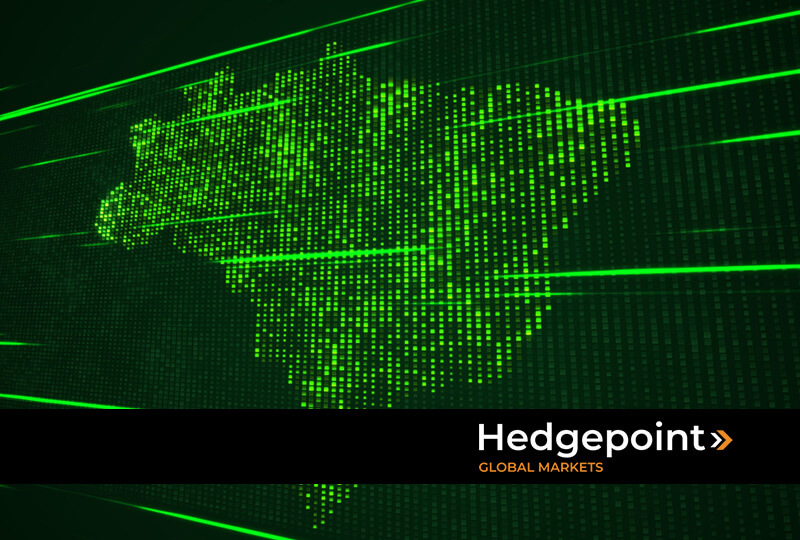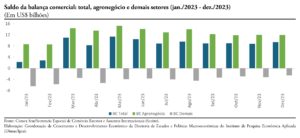
In this sense, commodities are an essential part of Brazilian exports and play an important role in the country’s Gross Domestic Product (GDP). In March al

In this sense, commodities are an essential part of Brazilian exports and play an important role in the country’s Gross Domestic Product (GDP).
In March alone, commodities accounted for 70% of exports. According to the Ministry of Agriculture and Livestock (MAPA), the quantum index, which measures the evolution of the volume of products that make up international shipments, rose by 14.6%.
Contrary to what one might think at first glance, this increase was not due to the production of grains such as soybeans and corn. The highlights were sugar, cotton and green coffee.
In a context where the balance of trade is mostly made up of commodities, how does Brazil benefit from the boom cycle in this sector? In this article, you’ll find out. Have a good read!
In 2023, Brazil’s foreign trade achieved historic records and a trade balance close to US$ 100 billion. Exports reached a figure of US$ 339.67 billion, an unprecedented result that exceeded the 2022 figures by 1.7%.
The volume exported increased by 8.7%, with prices falling by 6.3%. Imports, meanwhile, ended the year down 11.7% and with a balance of US$ 240.83 billion. One of the positive surprises was the oil and oil products sector, which reached a record surplus of US$ 25 billion in 2023, 20% higher than in 2022.
However, agribusiness continues to be one of the most significant and fundamental segments of the Brazilian economy. The sector achieved an accumulated surplus of US$ 148.58 billion, an increase of 4.9% from the previous year. Exports totaled US$ 165.05 billion.
The share of agribusiness in total exports from January to December 2022 reached 48.6%, as shown in the graph below.

These figures prove the extremely important role of the commodities market in Brazil. According to information from the Ministry of Development, Industry, Trade and Services (MDIC), agriculture and the extractive industry were mainly responsible for the increase in exports.
The products with the highest increase in foreign sales were:
The commodities market has a significant impact on Brazil’s trade balance due to its large share of product exports. After all, the country is one of the world’s largest producers and exporters of commodities such as soy, coffee, sugar, animal protein, iron ore, and oil.
Variations in the prices of these commodities therefore directly affect the performance of Brazil’s trade balance. For example, when commodity prices are high on the international market, Brazil’s export earnings can increase. This leads to a positive trade balance.
The Real, the country’s currency, also influences Brazil’s exports. Its appreciation makes Brazilian products more expensive than those from other countries, while its devaluation makes them more competitive.
In addition, a drop in international prices can reduce export revenues and, consequently, have a negative impact on the trade balance. In addition, global demand for commodities is influenced by macroeconomic, climatic, and geopolitical factors, such as economic growth and the trade policies of other countries.
Therefore, events such as economic recessions in major commodity consumers or changes in the trade policies of importing countries can affect demand. As such, Brazil runs the risk of suffering a decline in exports.
In 2023, the main destination for Brazilian exports was China. Shipments to the Asian giant totaled US$ 105.75 billion, an increase of 16.5% compared to 2022. It was the first time that exports to a single partner exceeded the US$ 100 billion mark.
Other highlights were Argentina, with an increase of 8.9% compared to 2022, which totaled US$16.72 billion. For the United States and the European Union, historically important destinations, there was a drop of 1.5% and 9.1%, respectively.
The succession of trade balance records has a reason: agribusiness. Alongside this, the country is also seeking to diversify Brazilian trade.
In general, the Chinese market plays a leading role for Brazil through the purchase of commodities. The figures reinforce the importance of this sector in achieving a positive trade balance. After all, soybeans, iron ore, and oil together account for 37.2% of exports.
In this sense, Brazil’s ability to produce and export commodities on a large scale, combined with its strategic geographical position and natural resources, strongly influences its trade performance. This highlights the power of agribusiness for the entire Brazilian economy.


Rua Funchal, 418, 18º andar - Vila Olímpia São Paulo, SP, Brasil
Contato
(00) 99999-8888 example@mail.com
Section
Home
O que Fazemos
Mercado
Quem Somos
HUB
Blog
Esta página foi preparada pela Hedgepoint Schweiz AG e suas afiliadas (“Hedgepoint”) exclusivamente para fins informativos e instrutivos, sem o objetivo de estabelecer obrigações ou compromissos com terceiros, nem de promover uma oferta ou solicitação de oferta de venda ou compra de quaisquer valores mobiliários, commodity interests ou produtos de investimento.
A Hedgepoint e suas associadas renunciam expressamente a qualquer uso das informações contidas neste documento que direta ou indiretamente resulte em danos ou prejuízos de qualquer natureza. As informações são obtidas de fontes que acreditamos serem confiáveis, mas não garantimos a atualidade ou precisão dessas informações.
O trading de commodity interests, como futuros, opções e swaps, envolve um risco substancial de perda e pode não ser adequado para todos os investidores. Você deve considerar cuidadosamente se esse tipo de negociação é adequado para você, levando em conta sua situação financeira. O desempenho passado não é necessariamente indicativo de resultados futuros. Os clientes devem confiar em seu próprio julgamento independente e/ou consultores antes de realizar qualquer transação.
A Hedgepoint não fornece consultoria jurídica, tributária ou contábil, sendo de sua responsabilidade buscar essas orientações separadamente.
A Hedgepoint Schweiz AG está organizada, constituída e existente sob as leis da Suíça, é afiliada à ARIF, a Associação Romande des Intermédiaires Financiers, que é uma Organização de Autorregulação autorizada pela FINMA. A Hedgepoint Commodities LLC está organizada, constituída e existente sob as leis dos Estados Unidos, sendo autorizada e regulada pela Commodity Futures Trading Commission (CFTC) e é membro da National Futures Association (NFA), atuando como Introducing Broker e Commodity Trading Advisor. A Hedgepoint Global Markets Limited é regulada pela Dubai Financial Services Authority. O conteúdo é direcionado a Clientes Profissionais e não a Clientes de Varejo. A Hedgepoint Global Markets PTE. Ltd está organizada, constituída e existente sob as leis de Singapura, isenta de obter uma licença de serviços financeiros conforme o Segundo Anexo do Securities and Futures (Licensing and Conduct of Business) Act, pela Monetary Authority of Singapore (MAS). A Hedgepoint Global Markets DTVM Ltda. é autorizada e regulada no Brasil pelo Banco Central do Brasil (BCB) e pela Comissão de Valores Mobiliários (CVM). A Hedgepoint Serviços Ltda. está organizada, constituída e existente sob as leis do Brasil. A Hedgepoint Global Markets S.A. está organizada, constituída e existente sob as leis do Uruguai.
Em caso de dúvidas não resolvidas no primeiro contato com o atendimento ao cliente (client.services@hedgepointglobal.com), entre em contato com o canal de ouvidoria interna (ombudsman@hedgepointglobal.com – global ou ouvidoria@hedgepointglobal.com – apenas Brasil) ou ligue para 0800-8788408 (apenas Brasil).
Integridade, ética e transparência são valores que guiam nossa cultura. Para fortalecer ainda mais nossas práticas, a Hedgepoint possui um canal de denúncias para colaboradores e terceiros via e-mail ethicline@hedgepointglobal.com ou pelo formulário Ethic Line – Hedgepoint Global Markets.
Nota de segurança: Todos os contatos com clientes e parceiros são realizados exclusivamente por meio do nosso domínio @hedgepointglobal.com. Não aceite informações, boletos, extratos ou solicitações de outros domínios e preste atenção especial a variações em letras ou grafias, pois podem indicar uma situação fraudulenta.
“Hedgepoint” e o logotipo “Hedgepoint” são marcas de uso exclusivo da Hedgepoint e/ou de suas afiliadas. O uso ou reprodução é proibido, a menos que expressamente autorizado pela HedgePoint.
Além disso, o uso de outras marcas neste documento foi autorizado apenas para fins de identificação. Isso, portanto, não implica quaisquer direitos da HedgePoint sobre essas marcas ou implica endosso, associação ou aprovação pelos proprietários dessas marcas com a Hedgepoint ou suas afiliadas.
aA Hedgepoint Global Markets é correspondente cambial do Ebury Banco de Câmbio, de acordo com a resolução CMN Nº 4.935, DE 29 DE JULHO DE 2021, Artigo 14 do Banco Central do Brasil (BACEN).
Para mais informações sobre nosso parceiro, serviços disponíveis, atendimento e ouvidoria, acesse o link a seguir: https://br.ebury.com/